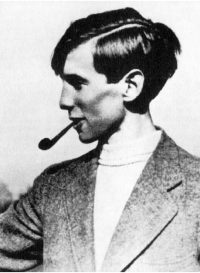After military service before the war, Schmorell began studying medicine in 1940. At university he met Hans and Sophie Scholl, two siblings who founded the White Rose movement. The White Rose was one of the only anti-Nazi German resistance groups to be founded in World War II. Through secretly made pamphlets and graffiti on walls all over Munich, The White Rose stood up to Adolph Hitler and the Nazis. As Inge Scholl put it in her book 'The White Rose':
" 'They stood up for a simple matter, an elementary principle: the right of the individual to choose his manner of life and to live in freedom.' "
Although all five founding members of The White Rose deserve their own articles, as they were all immensely brave and good people, I'm just here to talk a little bit about Mr. Schmorell. As I am fortunate enough to own Inge Scholl's book, 'The White Rose', I'm going to take advantage of that fact and use an excerpt from the text describing Alexander Schmorell better than I ever could. Inge Scholl (as you might have guessed) was Hans and Sophie's younger sister. This was what she wrote about Mr. Schmorell:
" 'Among the students Hans also met some who shared his sentiments. One especially among them caught his attention because of his tall figure and his totally unmilitary, elegant, and carefree bearing. This was Alexander Schmorell, son of a well-known Munich physician. Soon a close friendship developed between them, starting from the instinctive unanimity with which the two of them were always ready to disrupt the dull barracks life with their practical jokes and clever tricks. There can be few men who had Alex's radiant, relaxed humor. He beheld the world with eyes full of imagination - it was as if he saw it anew each day. He found the world beautiful, fresh, and filled with captivating delights, and he enjoyed it in an open, childlike way, without questioning or calculating. He was at once totally receptive and unstintingly generous, dispensing gifts royally. Sometimes, however, there appeared behind his cheerful, untrammeled manner something else - a questioning and seeking, an ancient, deep-seated seriousness.' "
What a guy! I don't have much to add to that except a short account of his imprisonment and execution. Because, yes, he was executed, along with all of the other members of The White Rose. After Hans, Sophie, and Christoph Probst (another member of The White Rose) were arrested, Alexander Schmorell attempted to escape to Switzerland, but he was recognized at an air-raid shelter and then arrested himself. At the second trial against The White Rose, on April 19th, 1943, he was sentenced to death. While in prison, he tried to console his family with letters saying that he was at peace with his fate and not fearful of death. On July 19th, 1943, at the age of 25, Alexander Schmorell was put to death by guillotine at the Munich-Stadelheim Prison, a martyr for what he believed in.
Alexander Schmorell remained an Eastern Orthodox Christian 'til the day he died, and so, on February 5th, 2012, he was glorified a saint by the Russian Orthodox Church Outside of Russia. That's right, Alexander Schmorell is not just a person you'd casually call a saint because of their seeming goodness and holiness, but he is officially a legitimate saint!
 |
| Schmorell was a medic in the war, so that's why there's a red cross on his arm. |
 |
| And here's one last picture of Alex with a horse, because it's really sweet and I love horses. |
- Irene




No comments:
Post a Comment